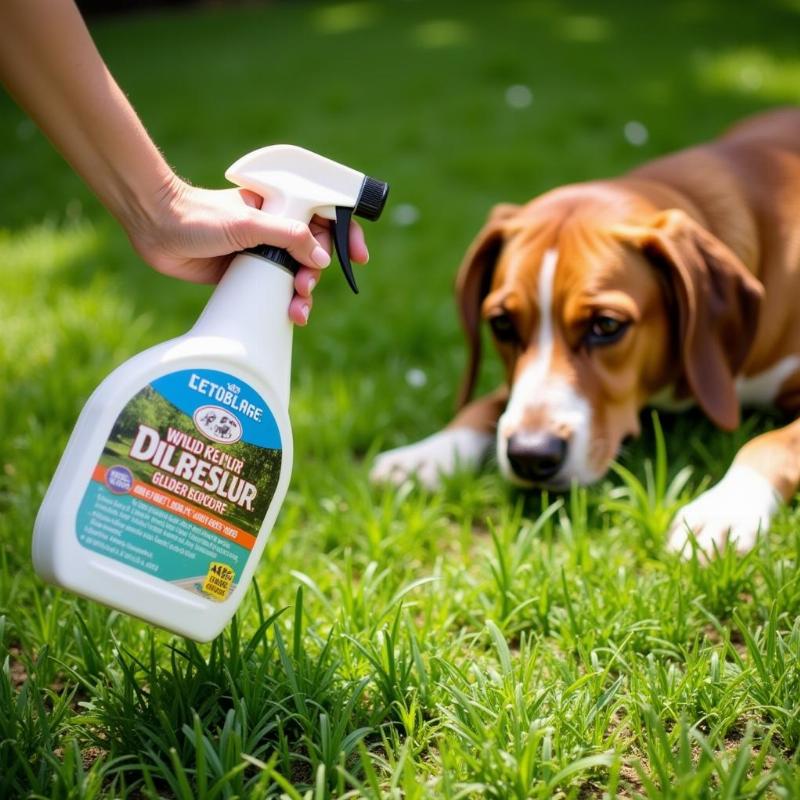Keeping your lawn lush and weed-free is a common goal for homeowners, especially those with dogs. But finding a weed and grass killer safe for dogs is paramount. Many common lawn care products contain chemicals that can be harmful, even deadly, to our canine companions. This article explores safe lawn care practices, providing you with the information you need to keep your yard beautiful and your dog healthy.
Understanding the Risks of Weed and Grass Killers
Before we dive into safe alternatives, it’s crucial to understand the potential dangers of conventional weed and grass killers. These products often contain herbicides, pesticides, and other chemicals that can be absorbed through your dog’s paws, skin, or even by ingestion if they lick treated areas. Symptoms of poisoning can range from mild irritation to serious neurological problems, and in some cases, can be fatal. Therefore, choosing pet-safe products is non-negotiable for responsible dog owners.
Pet-Safe Weed and Grass Killer Options
Fortunately, there are several effective weed and grass killer options available that won’t harm your furry friend. These include:
- Natural Herbicides: Vinegar-based solutions can be surprisingly effective against weeds, especially when applied directly to the leaves. Boiling water can also be used to kill weeds in cracks and crevices.
- Corn Gluten Meal: This natural pre-emergent herbicide prevents weed seeds from germinating. It’s safe for dogs and adds nitrogen to the soil, benefiting your lawn’s overall health.
- Iron-Based Herbicides: Products containing iron HEDTA are effective against broadleaf weeds and are considered safe for pets when used as directed.
 Applying pet-safe weed killer
Applying pet-safe weed killer
Maintaining a Healthy and Safe Lawn for Your Dog
Beyond choosing safe products, there are other steps you can take to maintain a healthy and safe lawn for your dog:
- Proper Application: Always follow the instructions on any product label carefully, even if it’s marketed as pet-safe.
- Watering: Water your lawn deeply and infrequently to encourage strong root growth, which helps prevent weeds.
- Mowing High: Keeping your grass slightly longer can shade out weed seedlings and make it harder for them to establish themselves.
- Regular Clean-up: Remove pet waste promptly to prevent the spread of parasites and diseases.
Identifying and Avoiding Toxic Plants
Be mindful of the plants in your yard and garden. Some common plants, such as azaleas, rhododendrons, and sago palms, are toxic to dogs. If you’re unsure about the safety of a particular plant, it’s best to err on the side of caution and remove it.
Creating a Designated Dog Area
Consider creating a designated dog area in your yard, using pet-friendly ground cover like clover or artificial turf. This can minimize your dog’s exposure to treated areas and provide them with a safe space to play.
When to Consult a Veterinarian
If you suspect your dog has been exposed to a harmful lawn care product, contact your veterinarian immediately. Symptoms such as vomiting, diarrhea, lethargy, or seizures should be treated as an emergency.
Conclusion
Maintaining a beautiful lawn and ensuring your dog’s safety doesn’t have to be mutually exclusive. By choosing weed and grass killer safe for dogs and following responsible lawn care practices, you can create a healthy and enjoyable outdoor environment for both you and your furry friend. Remember, your dog’s health is always worth the extra effort.
FAQ
-
What are some common signs of herbicide poisoning in dogs? Vomiting, diarrhea, lethargy, loss of appetite, excessive drooling, tremors, and seizures.
-
How long should I keep my dog off the lawn after applying a pet-safe weed killer? Always follow the product label instructions. Some products allow pets back on the lawn after the application has dried, while others recommend waiting longer.
-
Is vinegar a safe and effective weed killer? Vinegar can be effective against some weeds, especially when applied directly to the leaves. However, it’s not as potent as some commercial products and may require repeated applications.
-
What are some safe ground cover options for a dog area? Clover, artificial turf, and certain types of grasses are good options.
-
What should I do if my dog ingests a lawn care product? Contact your veterinarian or a pet poison control center immediately.
-
Are there any dog breeds more susceptible to herbicide poisoning? While any dog can be affected, smaller breeds and puppies may be more vulnerable due to their size and developing immune systems.
-
How can I prevent weeds naturally? Maintaining a healthy lawn through proper watering, mowing, and fertilization can help prevent weeds from taking hold.
Beautdogs.us is your premier source for all things dog-related in the US. We offer expert advice on dog breeds, care, and product recommendations to help you navigate the joys and responsibilities of dog ownership. Whether you’re a seasoned dog owner or just starting out, Beautdogs.us has the resources you need. Contact us today for personalized guidance. Email: [email protected], Phone: +1 501-555-7529.